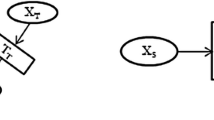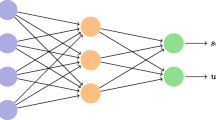Abstract
The notion of concept based on the semantics of objects is defined and illustrated. An underlying thread connecting a subset of concepts is identified. This class of concepts, called the Conceptual Transformer is defined and illustrated with real-world examples. This class finds a natural application in any area where objects can be characterized by functionality. Some interesting application areas are knowledge classification, manufacturing automation, and pattern synthesis. The salient features of this class are elaborated and a knowledge structure for representing concepts is proposed. The effect of these transformers on knowledge-directed classification, which results in the formation of virtual clusters, is examined in detail. We make use of examples from real life to bring out the efficacy of the proposed transformerbased, concept-directed classification.
Similar content being viewed by others
References
Anderberg, M.R., Cluster Analysis for Applications, Academic Press, New York 1972.
Michalski, R.S. and Stepp, R.E., Learning from observation: conceptual clustering, in R.S.Michalski, J.G.Carbonell, and T.M.Mitchell (eds.), Machine Learning: An Artificial Intelligence Approach, Tioga Press, Palo Alto, California, 1983.
Shekar, B. and Murty, M.N., A Semantic-directed pattern clustering scheme, Proc. 2nd International Conference on Advances in Pattern Recognition and Digital Techniques, calcutta, India, 1986.
Shekar, B., Murty, M.N. and Krishna, G., A knowledge-based clustering scheme, Pattern Recognition Lett. 5, 253–260 (1987).
Shekar, B., A model for the temporal behaviour of cohesiveness among concepts, submitted to the J. Indian Inst. Sci.
Michalski, R.S., Understanding the nature of learning: issues and research directions, in R.S.Michalski, J.G.Carbonell and T.M.Mitchell (eds.), Machine Learning An Artificial Intelligence Approach, Volume II, Morgan Kaufmann Publishers, California, 1986.
Winston, P.H., Artificial Intelligence, Addison-Wesley, Reading, Mass., 1984.
Curry, H.B., Foundations of Mathematical Logic, Dover, New York, 1977.
Wulf, W.A., Shaw, M., Hilfinger, P.N., and Flon, L., Fundamental Structures of Computer Science, Addison-Wesley, Reading, Mass., 1981.
Michalski, R.S. and Stepp, R.E., Automated construction of classifications: conceptual clustering versus numerical taxonomy, IEEE Trans. Pattern Analysis and Machine Intelligence PAMI 5, 396–410 (1983).
Deo, N., Graph Theory with Applications to Engineering and Computer Science, Prentice-Hall, New York, 1970.
Shekar, B., Murty, M.N., and Krishna, G., Pattern clustering: an artificial intelligence approach, 10th International Joint Conference on Artificial Intelligence, Milano, Italy, (1987), pp. 214–216.
Shekar, B., Murty, M.N., and Krishna, G., A framework for the synthesis of knowledge-directed pattern classes, Proc. Tencon '87, IEEE Region 10 Conference, Seoul, Korea, 1987.
Knuth, D.E., The Art of Computer Programming: Fundamental Algorithms, Addison-Wesley, Reading, Mass., 1973.
Vere, S.A., Inductive learning of relational productions, in D.A.Waterman and F.Hayes-Roth (eds.), Pattern Directed Inference Systems, Academic Press, New York, 1978.
Stepp, R.E. III and Michalski, R.S., Conceptual clustering: inventing goal-oriented classifications of structured objects, in R.S.Michalski, J.G.Carbonell, and T.M.Mitchell (eds.), Machine Learning An Artifical Intelligence Approach, Volume II, Morgan Kaufmann Publishers, California, 1986.
Author information
Authors and Affiliations
Rights and permissions
About this article
Cite this article
Shekar, B., Murty, M.N. & Krishna, G. Knowledge-based learning using Conceptual Transformers. J Intell Robot Syst 2, 361–379 (1989). https://doi.org/10.1007/BF00247914
Received:
Accepted:
Issue Date:
DOI: https://doi.org/10.1007/BF00247914




